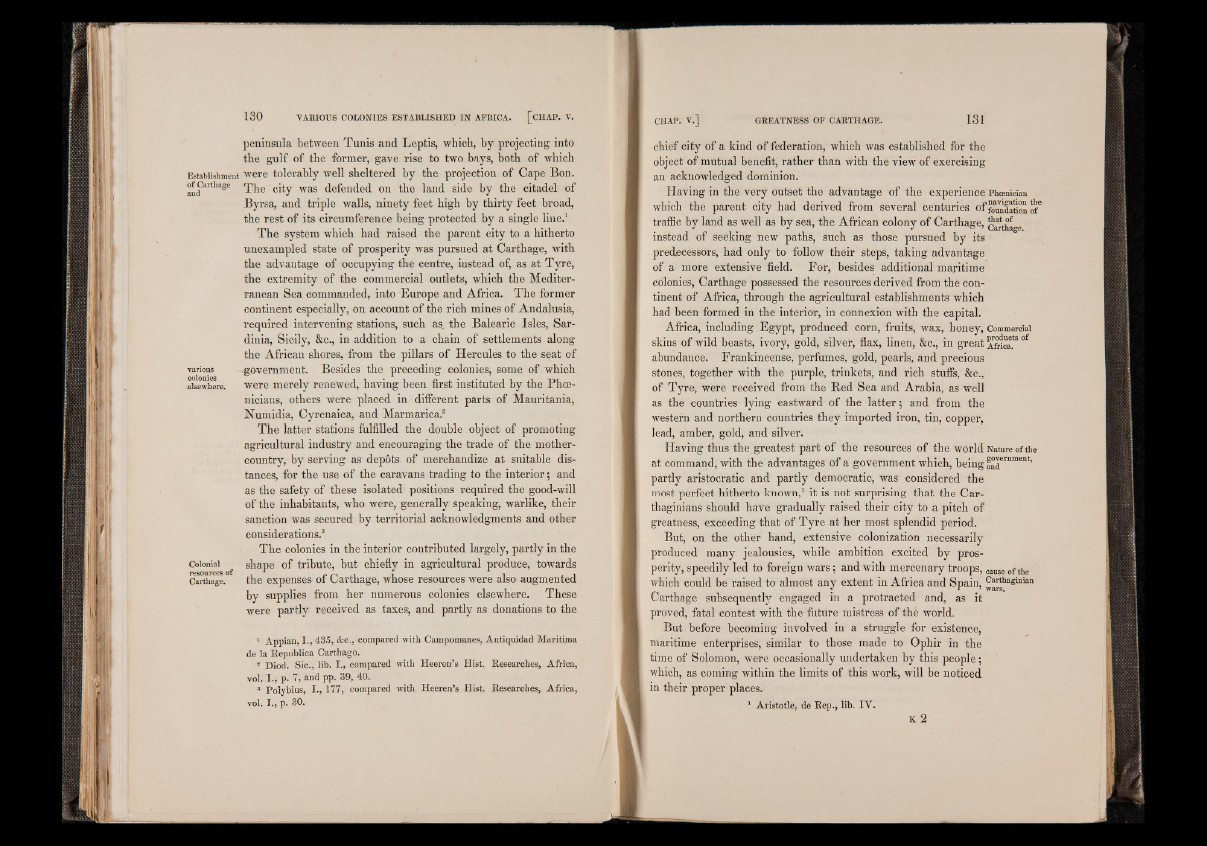
Establishment
of Carthage
and
various
colonies
elsewhere.
Colonial
resources of
Carthage.
peninsula between Tunis and Leptis, which, by projecting into
the gulf of the former, gave rise to two bays, both of which
were tolerably well sheltered by the projection of Cape Bon.
The city was defended on the land side by the citadel of
Byrsa, and triple walls, ninety feet high by thirty feet broad,
the rest of its circumference being protected by a single line.1
The system which had raised the parent city to a hitherto
unexampled state of prosperity was pursued at Carthage, with
the advantage of occupying the centre, instead of, as at Tyre,
the extremity of the commercial outlets, which the Mediterranean
Sea commanded, into Europe and Africa. The former
continent especially, on account of the rich mines of Andalusia,
required intervening stations, such as. the Balearic Isles, Sardinia,
Sicily, &c., in addition to a chain of settlements along
the African shores, from the pillars of Hercules to the seat of
government. Besides the preceding colonies, some of which
were merely renewed, having been first instituted by the Phoenicians,
others were placed in different parts of Mauritania,
Numidia, Cyrenaica, and Marmarica.2
The latter stations fulfilled the double object of promoting
agricultural industry and encouraging the trade of the mother-
country, by serving as dépôts of merchandize at suitable distances,
for the use of the caravans trading to the interior ; and
as the safety of these isolated positions required the good-will
of the inhabitants, who were, generally speaking, warlike, their
sanction was secured by territorial acknowledgments and other
considerations.3
The colonies in the interior contributed largely, partly in the
shape of tribute, but chiefly in agricultural produce, towards
the expenses of Carthage, whose resources were also augmented
by supplies from her numerous colonies elsewhere. These
were partly received as taxes, and partly as donations to the
1 Appian, I ., 435, &c., compared with Campomanes, Antiquidad Maritima
de la Republica Carthago.
2 Diod. Sic., lib. I., compared with Heeren’s Hist. Researches, Africa,
vol. I ., p. 7, and pp. 39, 40.
3 Polybius, I., 177, compared with Heeren’s Hist. Researches, Africa,
vol. I ., p. 30.
chief city of a kind of federation, which was established for the
object of mutual benefit, rather than with the view of exercising
an acknowledged dominion.
Having in the very outset the advantage of the experience Phoenician
which the parent city had derived from several centuries of foundation of6
traffic by land as well as by sea, the African colony of Carthage, Carthage
instead of seeking new paths, such as those pursued by its
predecessors, had only to follow their steps, taking advantage
of a more extensive field. For, besides additional maritime
colonies, Carthage possessed the resources derived from the continent
of Africa, through the agricultural establishments which
had been formed in the interior, in connexion with the eapital.
Africa, including Egypt, produced corn, fruits, wax, honey, Commercial
skins of wild beasts, ivory, gold, silver, flax, linen, &c., in great Africa*8 °f
abundance. Frankincense, perfumes, gold, pearls, and precious
stones, together with the purple, trinkets, and rich stuffs, &c.,
of Tyre, were received from the Red Sea and Arabia, as well
as the countries lying eastward of the latter; and from the
western and northern countries they imported iron, tin, copper,
lead, amber, gold, and silver.
Having thus the. greatest part of the resources of the world Nature of the
at command, with the advantages of a government which, being s°*ernment>
partly aristocratic and partly democratic, was considered the
most perfect hitherto known,1 it is not surprising that the Carthaginians
should have gradually raised their city to a pitch of
greatness, exceeding that of Tyre at her most splendid period.
But, on the other hand, extensive colonization necessarilv
produced many jealousies, while ambition excited by prosperity,
speedily led to foreign wars; and with mercenary troops, cause of the
which could be raised to almost any extent in Africa and Spain, Carthaginian
Carthage subsequently engaged in a protracted and, as it
proved, fatal contest with the future mistress of the world.
But before becoming involved in a struggle for existence,
maritime enterprises, similar to those made to Ophir in the
time of Solomon, were occasionally undertaken by this people;
which, as coming within the limits of this work, will be noticed
in their proper places.
1 Aristotle, de Rep., lib. IV .
K 2